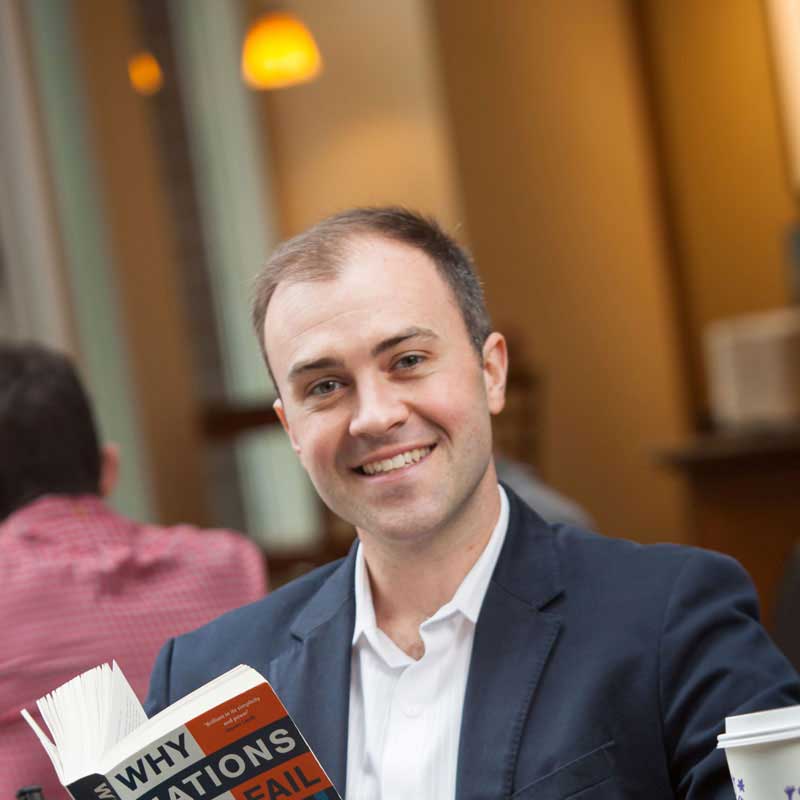Three minutes. That’s the time it will take Tim Johnson to present some of his recent research at the 2018 Annual Meeting of the American Association for the Advancement of Science (AAAS) on February 18, 2018, in Austin, TX.
 Johnson — Grace and Elmer Goudy Associate Professor of Public Management and Policy Analysis at Atkinson Graduate School of Management and Director of the Center for Governance and Public Policy Research at Willamette University — describes the AAAS Annual Meeting as a “jam session in which scientists, policy makers, and folks in the international community get together to discuss the AAAS’s important role in fostering scientific discussion, advocating for scientific exploration, and cultivating new generations of scientists.”
Johnson — Grace and Elmer Goudy Associate Professor of Public Management and Policy Analysis at Atkinson Graduate School of Management and Director of the Center for Governance and Public Policy Research at Willamette University — describes the AAAS Annual Meeting as a “jam session in which scientists, policy makers, and folks in the international community get together to discuss the AAAS’s important role in fostering scientific discussion, advocating for scientific exploration, and cultivating new generations of scientists.”
At this robust collection of intellects, experiences, and ideas, Johnson will present research he developed with Oleg Smirnov of Stony Brook University, titled “Economic Homophily Facilitates the Evolution of Cooperation.”
We’ll get to what exactly that means and the potential real-world implications. But first, why just three minutes?
Johnson decided to submit a proposal to AAAS to present an "e-poster," which is a visual representation of research that fits on a screen about the size of the flat-panel TVs that you might see in conference rooms or sports bar. Alongside the display, Johnson will have three minutes to summarize his work.
“I've never had the chance to present my work in such a concise manner, but the appeal to doing so was immediately apparent to me: the format provides an opportunity to deliver an efficient, information-rich summary that folks can then delve deeper into via questions and comments,” Johnson explained. “In that respect, it allows the presenter to ‘co-produce’ the talk with the audience, thereby customizing the information to the interests and curiosities of those folks in attendance.”
That explains how Johnson will present. Now, what the heck is economic homophily and how does it facilitate the evolution of cooperation?
In very simple terms, it’s all about how cooperation survives in conditions where coasting on the efforts of others is an attractive option.
“We've all seen it happen,” Johnson explained. “You're working on a project with a team and one individual free-rides on the group's hard work, thus getting the laurels of the group's cooperative output without having to incur the costs to produce it.”
Such free-riding is always possible in cooperative group efforts and you might expect opportunities for free-riding to prevent cooperation because it proves so lucrative. “You get the gains without the costs!” Johnson said.
But that doesn’t represent what we see happen in our lives. We see successful cooperation all around us — among humans and non-human organisms, alike. So, Johnson and his research partner Smirnov square up against a question that puzzles social scientists and biologists, “Why do we see so much cooperation when free-riding appears advantageous?"
With scientists coming at this question using a number of mathematical and computational models to study the mechanisms that produce successful cooperation, Johnson and Smirnov studied a novel one. Their model explores the idea “that individuals can use wealth inequalities resulting from past cooperative endeavors as a way to identify and avoid social partners likely to be free-riders, while simultaneously channeling cooperation to those individuals who use their same cooperative strategy,” Johnson said. “It turns out that cooperating with one’s economic equal facilitates successful cooperation and provides one reason why we might see cooperation succeed despite the gains from free-riding.”
So what might this research mean for how we view cooperation in our daily lives?
“This research provides hypotheses about the conditions in which we might expect to see more cooperation in our day-to-day lives,” Johnson advised. “In situations in which individuals can observe each others' material wealth and differences in that wealth are small, our model predicts that individuals are more likely to cooperate successfully.”
In fact, existing empirical evidence from laboratory studies already shows that cooperation declines when wealth inequalities are large and can be readily observed, thus Johnson and Smirnov’s findings help explain why that is the case.
Looking forward, this research also provides “reason to look into everyday scenarios--such as workplaces, community projects, and so forth — to examine whether wealth inequalities influence rates of cooperation.”

